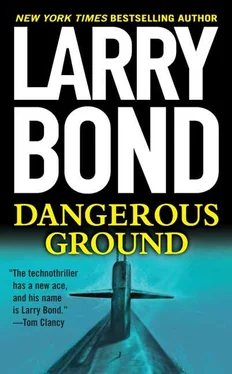Behind the torpedo tubes, in the middle of the room, were the three two-leveled torpedo stowage racks where up to twenty-two weapons could be stored. Normally, a 688-class boat would leave two slots, or “stows” vacant, so that torpedoes could be removed from the tubes for maintenance. With four weapons in the tubes, a 688 would usually go to sea with a mix of twenty-four torpedoes and Tomahawk cruise missiles. Memphis, however, was not a normal 688. The Manta control station, located at the port, aft end of the centerline stowage rack, reduced the number of weapons that could be stored by four.
Integral to the outboard torpedo stowage racks was the reloading equipment. Loading trays on the inboard side of the two racks were designed to pivot, so that they could align themselves with the canted tubes. Hydraulic rams would then push the weapons into the tubes. Moving weapons on the racks, or indexing weapons, was also done with a complex system of hydraulically driven gears and linkages. Again, if necessary, loading could be done manually with a block and tackle and lots of manpower.
Jerry knew Foster was intentionally moving at warp speed, either to show how much he knew about Memphis’ main armament and how little Jerry knew, or to get the tour of the spaces over and done with as soon as possible. Probably both, Jerry thought. Still, he asked his senior chief numerous questions that required Foster to slow down to answer. Most of the questions Jerry asked were honest inquiries for clarification of something that Foster had said or for additional explanation of a system’s function. For some of his questions, however, Jerry already knew the answer and he wanted to compare it to what Foster would tell him.
After a couple of hours, Jerry allowed his first tour of the torpedo room to come to an end. TM1 Moran and two of the more junior torpedomen were well into their PMS check on tubes two and four. Undoubtedly, Foster would want to look in on them; something Jerry wholeheartedly approved of. Impressed by Foster’s knowledge, Jerry was sincerely appreciative for the tour, even if it was given begrudgingly.
“Thank you for the tour, Senior Chief. It would seem that I have an awful lot to learn about the systems that are in this room. I trust you won’t mind if I ask you some more questions from time to time.”
“You’re most welcome, sir,” responded Foster with some sarcasm. “Sir, I would like to go and look in on the maintenance check. Petty Officer Moran has the two most junior torpedomen working with him and I’d like to see how they are doing.” The emphasis on the junior TMs hopefully would free him from this overly inquisitive officer.
“Certainly, Senior, carry on.” Jerry made sure his voice was neutral and polite. Despite Foster’s less than friendly behavior over the last few hours, Jerry knew that he had to work with this man if he was to have a smooth-running division. And he needed that if he was to obtain his ultimate goal: his gold dolphins and a career in submarines.
Just as Senior Chief Foster was preparing to leave, Lieutenant Richards popped out from behind the starboard tube nest and made his way down to Jerry and Foster.
“There you are, Mr. Mitchell. I see you and the Senior Chief have begun your turnover.”
“Yes, sir,” replied Jerry. “Senior Chief Foster has just finished giving me a tour of the torpedo room and it is clear that I have much to learn.”
“Well, that’s a start, at least,” said Richards as he tossed some folded papers into Jerry’s hands. “I need a new watch schedule for your division ASAP, the other one is now OBE.”
“Sir, I don’t understand. I’m sure Senior Chief Foster’s watch schedule was correct for a port and starboard duty section.” Jerry wasn’t entirely certain of this, but defending his leading chief was the right thing to do.
“I said it was OBE, Mr Mitchell, not incorrect. The XO and the COB have convinced the Captain that a Port and Starboard watch rotation isn’t necessary and would likely have a negative impact on the crew’s performance when we finally get underway. So we are now going to a three-section duty rotation.”
Foster let out a short whistle and said, “Leave it to Mr. B and Master Chief Reynolds to tag-team the Captain, again!”
“Regardless of how it happened, Senior Chief, I still need a new watch bill for your division and I want it by 1700 today,” snapped Richards.
“Understood, sir,” replied Jerry, who then turned to Foster. “Senior Chief, I’ll take the first stab at the new three-section duty schedule while you handle the repair parts list and are looking in on the PM work. I’ll bring the schedule by for your review before I turn it in to the WEPS.”
“Yes, sir, if you insist, sir,” said Foster coldly.
“Yes, Senior Chief, I do insist. I need to start pulling my weight on this boat and I can begin by doing this. Oh, and Senior Chief, please pass on the news to the rest of the division. I’m sure they’ll appreciate it.”
Foster merely nodded and walked over to where Moran and company were performing the maintenance check.
“I expect your schedule to be correct, Mr. Mitchell,” warned Richards.
“Of course, sir. You’ve made that very clear. Now, if you will excuse me, sir.” And with that, Jerry headed back to his stateroom to begin his first assignment.
As Jerry was hustling back to his stateroom, he nearly collided with Lenny Berg as he and Washburn were leaving.
“That’s the second time in one day that I almost collided with you, Jerry!” exclaimed Berg, who feigned a fainting spell. “You, sir, are a menace to navigation.”
Jerry was also surprised by the near miss and while he heard Berg’s little quip, for some reason he homed in on the word “menace,” his former call sign. Jerry’s face must have been a looking glass to his heart as Berg quickly dropped his goofy smile and said, “Hey, Jerry, lighten up. It was only a joke. Hey, the Chop and I were just going to lunch. Care to join us? I know this neat little place down the passageway that serves great fried chicken.”
“Uh, no thanks, Lenny. I’m really not all that hungry and I have to redo the watch bill for the WEPS, so I guess I’ll pass.”
“Oh, Jerry, bad move, dude! You don’t want to insult the Chop here. You’ll find puree of peas at your next meal. It’s naasty.”
“Knock it off, Lenny,” said Washburn. “If the man has work to do and he wants to skip a meal, I will in no way be insulted. However, if I hear any more about the smashed peas I served with the fish and chips from you again, it will become a self-fulfilling prophecy!”
“Okay, okay! Some people just can’t handle honest criticism. See ya later, Jerry.”
Jerry entered his stateroom and retrieved the service jackets he had left on his bunk. He started to review them again with a new sense of purpose, as he had to identify who had the proper qualifications and compare the records to the original watch bill that Senior Chief Foster had put together. The process took longer than Jerry had thought it would, a lot longer. But at 1600, he had what he believed was a good draft watch bill. With an hour left before his deadline, Jerry returned the service jackets to YN1 Glover and he went in search of Senior Chief Foster.
When Jerry reached the torpedo room, Foster was nowhere to be found. Jerry looked around the room and saw one of the TMs cleaning up over by the port tube nest. As Jerry approached, the sailor stood up and Jerry recognized him as the second class he had seen earlier.
“Excuse me, Petty Officer Greer, do you know where I can find the senior chief?”
“No, sir, I haven’t seen him for about half an hour. He left after putting the repairs parts list together and filling out the electronic two-kilos,” replied Greer. The “two-kilo” is the standard Navy requisition form that has to be filled out for every spare part in the supply system. The fact that Foster had already done them was encouraging.
Читать дальше












